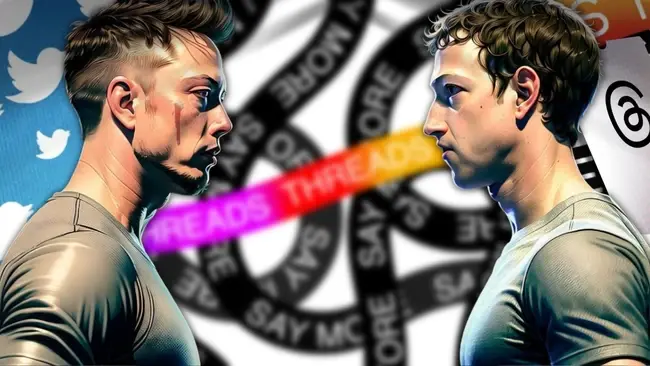Twitter is now threatening to sue Meta and Elon Musk is resorting to personal attacks, tweeting and literally challenging Zuckerberg a fight. I wish I was kidding, but it’s real.

Within a remarkably short span of just over 14 days, Threads, the competing app launched by Meta to rival Twitter, has attracted a staggering 125 million users, making it the fastest-growing app in history!
Threads has already managed to gather a user base equivalent to a quarter of Twitter's total monthly active users, indicating its potential to become a serious contender to Twitter's dominance.
This rapid success seems to be causing distress to Elon Musk, who is not handling his rival's achievements well.
Amidst this competition, Twitter is now threatening to take legal action against Meta, while Elon Musk has taken to personal attacks.
He has been tweeting and even challenging Zuckerberg to a fight, and it's a situation that sounds unbelievable, but unfortunately, it is very real.
The Downfall of Twitter:
Although Elon Musk may direct his anger towards Zuckerberg, he is essentially responsible for Twitter's downfall.
Throughout the 2010s, Mark Zuckerberg faced numerous scandals on Facebook, and he likely desired an opportunity to rebuild his image. Interestingly, Elon Musk inadvertently provided him with the chance to do so.
Ever since Musk acquired Twitter eight months ago, he has been making changes to the platform that favoured himself while showing condescension towards its users. Among these changes was the removal of the legacy verification system, resulting in the removal of blue checkmarks from journalists and granting them to anyone willing to pay $8.
As a consequence of these alterations, disinformation began to spread, with brands and politicians getting impersonated, causing confusion about identity on the platform. Twitter's algorithmic feed, known as "For You," started pushing a deluge of unhinged far-right content from accounts with $8 blue checkmarks, further fueling the problem.
The platform, which once served as a valuable tool for sharing real-time information, transformed into a breeding ground for outrage and radicalization. All of these changes ultimately contributed to Twitter's decline as a reliable platform for genuine communication and news dissemination.
An alternative platform?:
Soon after Musk acquired Twitter in October 2022, users swiftly started demanding and searching for alternative platforms, hoping to find better options.
Throughout the past year, numerous alternatives have emerged, some of which achieved considerable success, amassing hundreds of thousands of users. Notable alternatives like Bluesky, Spoutible, and Spill have gained popularity.
While these alternative platforms have managed to cultivate thriving niche communities, it remains challenging for them to attain the massive user base required to become the primary alternative to Twitter, which boasts hundreds of millions of users.
Meta’s Advantage:
Prior to the emergence of Threads, it seemed that we were heading towards a gradual and extended shift from Twitter to various alternative platforms, each catering to specific Twitter niches. However, Threads has demonstrated the ability to accomplish what other alternatives have not.
When users transition to a new social network and start with no followers or find that the people they are looking for are not present, it can hinder the growth rate and diminish the initial excitement.
This is where Meta's advantage comes into play and clarifies Threads' rapid success. The app directly integrates with Instagram's vast user base of two billion people.
Although Threads is still lacking certain essential features, such as a following feed, direct messaging, and the ability to search for posts, users have one algorithmic feed that combines content from both the people they follow and recommendations from those they do not.
What’s next?
The question of whether Threads will ultimately be the demise of Twitter remains uncertain. However, what is evident is that Elon Musk has already significantly transformed Twitter, leaving us with a mere remnant of the platform we once had a complex love-hate relationship with.







Comments ( 0 )